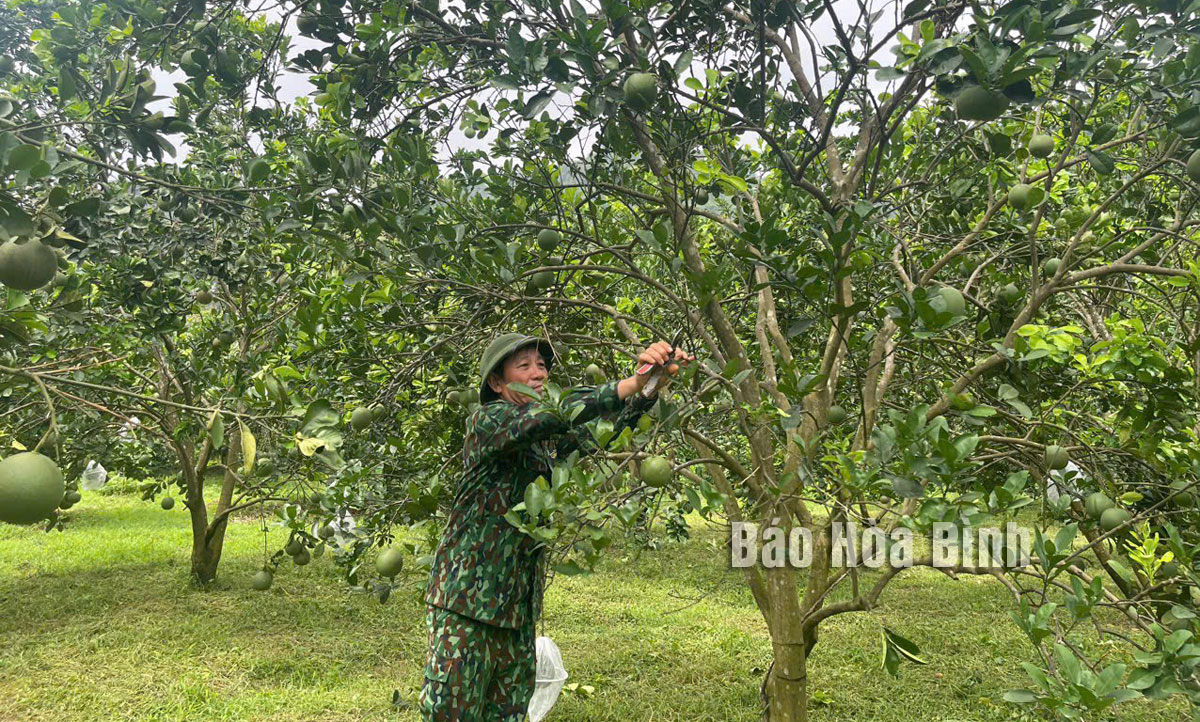
Luong Son district of Hoa Binh province has focused on building model residential areas and model gardens to help local people promote their role in building new-style rural areas and civilised urban areas, thus maintaining its status as a new-style rural district.
Local households in Thanh Ha village of Thanh Cao commune have focused on developing Dien pomelo farms towards VietGAP standards with high economic efficiency.
Concreted roads with glorious flowers along the sides leave visitors first impression when coming to Tan Hoa village of Hoa Son commune, which is the first commune recognised as a model new-style rural residential area.
Nguyen The Truyen, Secretary of the Party cell of the village, said that the village has 127 households with a per capita income of 56 million VND (2,203 USD). Three local household have had their gardens meeting the standards of model gardens.
Ha Huy Tu, the owner of a model garden covering an area of more than 5,000 sq.m in the village, said that he has divided his garden into separated areas for vegetable and fruit tree cultivation and breeding. The entire farming area has a drip irrigation system, while the breeding area has a waste treating system using biotechnology to ensure environmental protection.
Hoa Son is one of the first communes of Luong Son district to be recognised as a new-style rural area. The commune has seen great improvements thanks to local people's active engagement and contributions to the construction of a cultural house, village gates, power transmission lines, roads and camera installation.
Hoa Son is not the only locality in Luong Son to show strong performance in building model new-style rural areas and model gardens.
Dinh Duy Hung, Chairman of the People’s Committee of Luong Son town, said that since the town launched the movement to build model residential areas and civilised urban areas towards the goal of completing criteria for a ward-level urban area, it has received active and positive response from local people, especially in widening roads, cleaning streets and installing security camera systems. Particularly, the living conditions of residents have been greatly improved, he noted.
So far, the district has had 28 model residential areas and 54 model gardens meeting criteria stated in the provincial People’s Committee’s Decision No. 2188/QD-UBND.
This year, the locality is striving to have at least two additional model new-style rural residential areas and three more model gardens.
Bui Thi Ninh, Deputy Head of the Division of Agriculture and Rural Development of Luong Son, said that during the implementation of the campaign to build new-style rural areas and civilised urban areas, the district has focused on developing model new-style rural residential areas and civilised urban residential areas as well as fulfilling criteria directly relating to local people's life quality such as employment, income, and cultural identity preservation and promotion, environmental protection, and security.
The district has promoted the role of the community in choosing the most suitable methods to build model residential areas, she stressed.
Hoa Binh province is undergoing a dynamic transformation amid Vietnam’s national digital transition. Building on Poliburo’s Resolution No. 57-NQ/TW on breakthroughs in science, technology, innovation, and national digital transformation, the province has rolled out a wide range of practical action plans. A standout initiative is the "Digital Literacy for All” movement, an effort to ensure that no one is left behind in the digital era.
Hoa Binh province is undergoing a dynamic transformation in the wake of the national digital transformation movement. Building on Resolution No. 57-NQ/TW of the Politburo on breakthroughs in science, technology, innovation, and national digital transformation, the province has implemented a wide range of practical action plans. A standout initiative is the "Digital Literacy for All” movement ambitious effort to ensure that no one is left behind in the digital age.
With a spirit of unity and proactive problem-solving, the Party Committee, the government and the people of Dong Lai Commune (Tan Lac District) have made great strides in implementing the resolutions of the 24th Party Congress of the commune for the 2020 - 2025 term. Focusing on leadership and practical actions, the commune has brought the Party’s resolutions into daily life, creating strong impacts and pushing the local development forward.
Amid the nationwide push for digital transformation, young people in Hoa Binh Province are stepping up as dynamic pioneers, applying technology to enhance Youth Union operations and expand the reach of youth-led initiatives. Through creativity and adaptability, Youth Union organizations at all levels have introduced a series of practical solutions, contributing to modern governance and community development.
In recent years, An Nghia commune, located in Lac Son district, has stepped up administrative reform, focusing on improving the quality and efficiency of its single-window service unit for receiving and processing administrative procedures. These improvements have helped create favourable conditions for local residents and organisations to handle administrative procedures, contributing to the commune’s broader socio-economic development.
The Prime Minister-approved master plan to develop the multi-use value of forests ecosystems through 2030, with a vision to 2050, aims to improve the management and sustainable use of forest resources, create jobs, increase incomes, and improve the living standards of ethnic minorities, people in mountainous and remote areas, forest workers and those living near forests.



